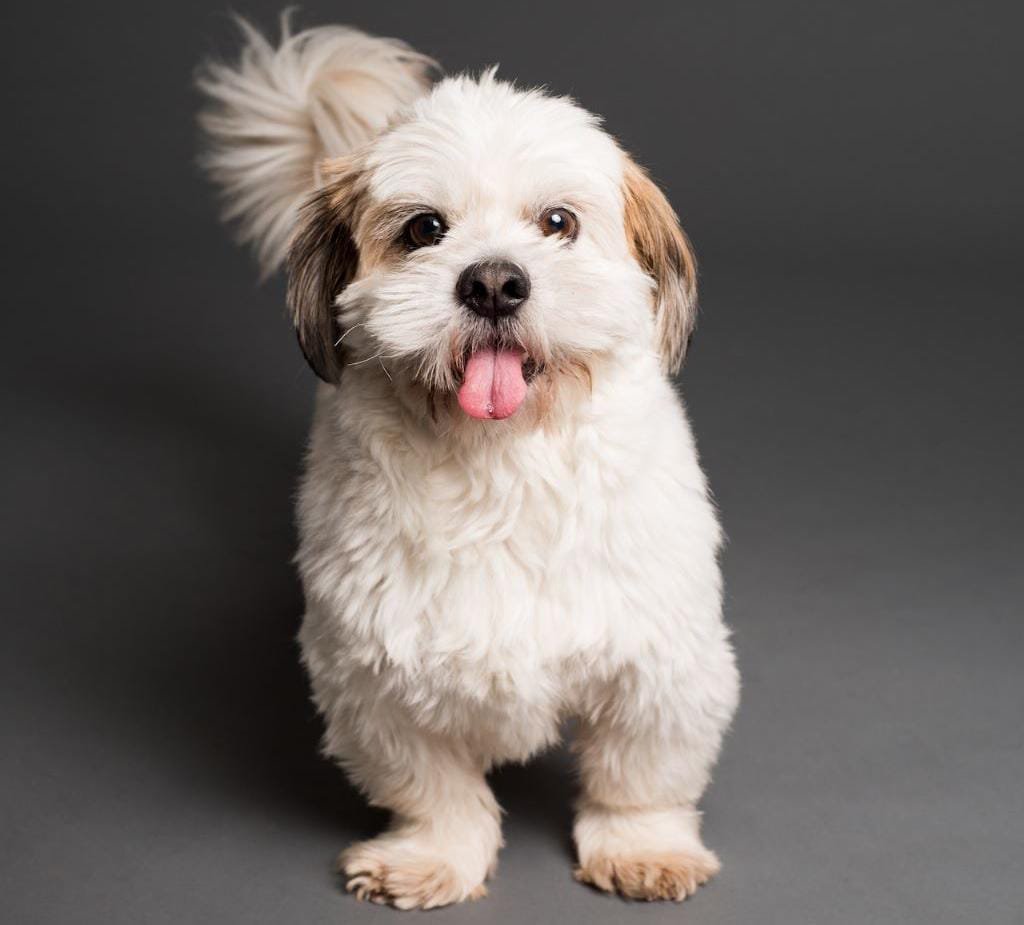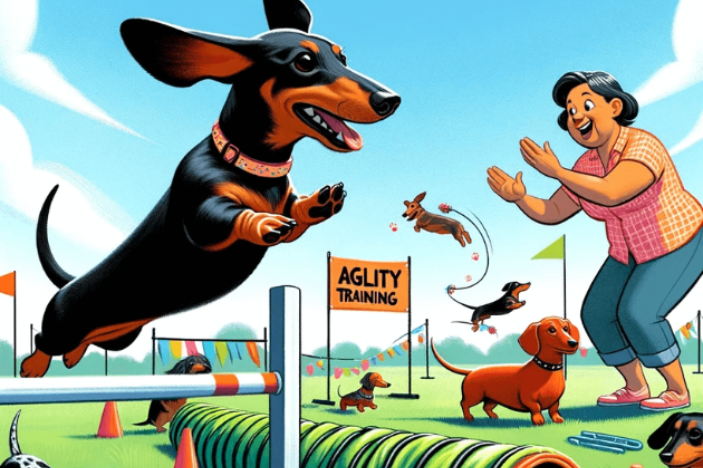A White Liver Shih Tzu refers to a Shih Tzu dog with a liver-colored coat that is predominantly white. The term liver in reference to dog coat color usually indicates a dark brown color, similar to the color of a liver organ. In this case, the liver-colored patches are present on a predominantly white coat.
Shih Tzus are a small breed of dog known for their luxurious and long coats. They come in various colors and patterns, including liver and white combinations. The liver coloration can appear in patches, often seen on the ears, body, or face, while the remaining areas of the coat are white.
It’s important to note that coat colors can vary in individual dogs, and the liver-white combination is just one possibility. The liver coloration in Shih Tzus is a result of genetic factors, and breeders who specialize in producing liver-colored Shih Tzus can provide further information on this particular variation
Is White Liver Shih Tzu a Lovable Dog?
Yes, White Liver Shih Tzu, just like any other Shih Tzu, is known for their lovable and affectionate nature. Shih Tzus, in general, are highly regarded as companion dogs and are often cherished for their friendly and affectionate temperament. They are known to be loyal and gentle and enjoy being around their human family.
Liver Shih Tzus have the same delightful personality traits as other Shih Tzu color variations. They tend to be playful, and friendly, and enjoy spending time with their owners. Shih Tzus, regardless of their coat color, thrive on human companionship and make loving and devoted pets.
It’s important to note that every dog, regardless of breed or color, has its own unique personality. While breed characteristics can provide a general idea of a dog’s temperament, individual variation can occur.
It’s always recommended to spend time with a dog, including Liver Shih Tzus, before making a decision to ensure compatibility and assess their suitability as a lovable companion for your specific needs and lifestyle.
How to Train White Liver Shih Tzu?
To train a White Liver Shih Tzu to become a lovable dog,
Here are some general tips and guidelines
White Liver Shih Tzu Start with socialization
Introduce your Shih Tzu to various people, animals, and environments from an early age. This helps them become comfortable and well-adjusted in different situations.
Use positive reinforcement
Reward your Shih Tzu with treats, praise, and affection when they display desired behaviors. Positive reinforcement encourages them to repeat those behaviors in the future.
Basic obedience training
Teach your Shih Tzu basic commands such as sit, stay, come, and down. Use short training sessions with positive reinforcement to keep them engaged and interested.
Be patient and consistent
Shih Tzus can be a bit stubborn at times, so patience is key. Use consistent training methods and cues to avoid confusing your dog.
Focus on house training
Establish a routine for bathroom breaks and reward your Shih Tzu when they eliminate in the appropriate spot. Consistency and positive reinforcement are essential for successful house training.
White Liver Shih Tzu Teaches bite inhibition
Shih Tzus have a small size and may be prone to nipping or biting. Encourage gentle play and discourage any aggressive behavior. If they nip, respond with a firm “no” and redirect their attention to a suitable toy.
White Liver Shih Tzu Provide mental stimulation
Shih Tzus are intelligent dogs and need mental stimulation to prevent boredom. Use puzzle toys, treat-dispensing toys, and interactive games to keep their minds engaged.
White Liver Shih Tzu Grooming and handling training
Start grooming and handling your Shih Tzu from a young age. Get them used to being touched, brushed, and examined by gently handling their paws, ears, and teeth. This will make grooming sessions and veterinary visits easier and less stressful for both of you.
White Liver Shih Tzu Show love and affection
Shih Tzus thrive on love and attention. Spend quality time with your dog, give them plenty of physical affection, and provide a comfortable and safe environment. A happy and loved Shih Tzu will be more inclined to be a lovable companion.
Remember, training takes time and consistency, so be patient and enjoy the process of bonding with your Shih Tzu. If needed, you can also consider enrolling in obedience classes or working with a professional dog trainer to enhance your training efforts
Are liver-colored Shih Tzus rare?
Liver-colored Shih Tzus are relatively rare compared to other common coat colors seen in the breed, such as gold, black, white, or combinations of these colors. The liver is a less common color variation in Shih Tzus and can be sought after by some individuals who appreciate its unique appearance.
The liver coloration in Shih Tzus is a result of genetic factors and requires specific breeding to produce. It is a recessive trait, meaning both parents must carry the liver gene for it to be expressed in the offspring. Breeders who specialize in producing liver-colored Shih Tzus may selectively breed dogs with this specific genetic makeup to maintain and produce the liver coat color.
Because of the relative rarity and demand for liver-colored Shih Tzus, they may be more difficult to find and may come at a higher price compared to more common coat colors. It’s important to research and find reputable breeders who prioritize the health and well-being of their dogs when looking for a liver-colored Shih Tzu or any specific color variation
Does Shih Tzus bark a lot?
Shih Tzus have a tendency to bark, but the frequency and intensity of their barking can vary between individual dogs. Some Shih Tzus may be more prone to barking than others, but it’s important to note that excessive barking can be influenced by various factors including genetics, training, socialization, and the dog’s environment.
Shih Tzus were originally bred as companion dogs and can be quite alert and protective of their family. They may bark to alert their owners of potential intruders or when they perceive a threat. Additionally, Shih Tzus can be sensitive to changes in their environment or routine, and this may trigger barking as a response.
Proper training and socialization from a young age can help minimize excessive barking. By teaching your Shih Tzu appropriate cues and commands, you can help them understand when it’s appropriate to bark and when it’s not. Positive reinforcement training techniques can be effective in teaching them to be quiet on command.
It’s also important to address any underlying causes of excessive barking. Ensuring that your Shih Tzu receives enough mental and physical exercise, providing them with appropriate toys and activities, and addressing any anxiety or discomfort they may be experiencing can all contribute to reducing excessive barking.
Overall, while Shih Tzus may have a tendency to bark, proper training, socialization, and attention to their needs can help manage and minimize excessive barking behaviors
Is Shih Tzus a lazy dog?
Shih Tzus are not inherently lazy dogs, but they do have a reputation for being more on the low-energy side compared to some other breeds. However, it’s important to note that individual Shih Tzus can have varying energy levels and personalities.
Shih Tzus are generally known for their affectionate and calm nature. They enjoy spending time with their owners, receiving attention, and being lap dogs. They are content with moderate exercise, such as short walks or indoor play sessions. They are not typically high-energy or hyperactive dogs.
While Shih Tzus may not require as much physical exercise as some other breeds, it’s still essential to provide mental stimulation and engage them in activities to prevent boredom. Interactive playtime, puzzle toys, and short training sessions can help keep their minds active and provide some exercise as well.
It’s worth mentioning that every dog is an individual, and some Shih Tzus may have higher energy levels or be more active than others. Proper socialization, training, and regular exercise tailored to your specific Shih Tzu’s needs will contribute to their overall well-being and happiness
Why Brown Shih Tzu Puppies are becoming popular?
The popularity of brown Shih Tzu puppies, also known as liver-colored Shih Tzus, may be attributed to a combination of factors:
- Unique and Eye-Catching Appearance: Brown or liver-colored Shih Tzus have a distinctive and less common coat color compared to the more traditional colors like gold, black, or white. Their rich, chocolatey, or liver-colored coats can be visually appealing and stand out among other Shih Tzus.
- Rarity: Liver-colored Shih Tzus are relatively rare compared to other coat colors in the breed. The combination of their unique color and relative scarcity can make them desirable to individuals seeking a more uncommon and distinctive-looking dog.
- Fashion and Trends: Dog breeds and specific coat colors often experience fluctuations in popularity based on current fashion and trends. The rise in popularity of brown Shih Tzus may be influenced by shifts in preferences and the desire for something different and unique.
- Social Media and Influencers: Social media platforms and influencers can have a significant impact on dog breed popularity. If a brown Shih Tzu gains attention or is featured by popular influencers, it can contribute to increased interest and demand for that particular color variation.
- Personal Preference: Ultimately, personal preference plays a significant role in the popularity of any specific dog color or breed. Some individuals simply have a preference for the appearance and charm of brown Shih Tzus, finding them particularly attractive and appealing.
It’s important to note that popularity trends can vary over time, and the decision to bring a specific color of Shih Tzu into your home should primarily be based on your ability to provide a loving and responsible environment for the dog, regardless of coat color. Responsible breeders should prioritize the health, temperament, and overall well-being of their dogs, rather than focusing solely on coat color
How to Care for a Brown Shih Tzu Puppy?
Caring for a brown Shih Tzu puppy is similar to caring for any other Shih Tzu puppy. Here are some essential aspects of their care:
Nutrition
Provide your brown Shih Tzu puppy with a balanced and age-appropriate diet. Consult with your veterinarian to determine the best type of food, feeding schedule, and portion sizes for your puppy’s specific needs. Ensure access to fresh water at all times.
Grooming
Shih Tzus have long, luxurious coats that require regular grooming. Brush your brown Shih Tzu puppy’s coat daily to prevent matting and tangles. Regular bathing, nail trimming, ear cleaning, and teeth brushing are also necessary for their overall hygiene. Consider professional grooming services if you are not comfortable or experienced in grooming.
Exercise
Although Shih Tzus are not highly energetic dogs, they still require regular exercise to maintain their health and prevent obesity. Take your brown Shih Tzu puppy for short walks or play interactive games indoors. Ensure they have a safe and secure environment for playtime.
Training and Socialization
Start training your brown Shih Tzu puppy early, focusing on basic commands, leash manners, and house training. Socialize them by exposing them to different people, animals, and environments to ensure they grow up to be well-rounded and confident dogs.
Health Care
Schedule regular visits with a veterinarian for vaccinations, deworming, and preventive care. Shih Tzus can be prone to certain health issues such as eye problems, dental issues, and skin conditions, so monitoring their health and addressing any concerns promptly is crucial.
Love and Attention
Shih Tzus are companion dogs and thrive on love and attention. Spend quality time with your brown Shih Tzu puppy, provide mental stimulation through interactive play, and ensure they are part of your family activities. Shih Tzus can develop separation anxiety, so gradually introduce them to alone time to prevent over-dependence.
Safety
Create a safe environment for your brown Shih Tzu puppy by puppy-proofing your home. Remove any potential hazards, secure electrical cords, and keep toxic substances out of reach. Provide a comfortable bed and a designated area for their food and water.
Remember, each puppy is unique, and their care requirements may vary. Pay attention to your brown Shih Tzu puppy’s individual needs, monitor their behavior, and consult with your veterinarian for specific guidance based on their health and development.
What is the average lifespan of a Shih Tzu?
Shih Tzus have an average lifespan of around 10 to 16 years, with some living even longer with proper care.
Is Shih Tzus good with children?
Shih Tzus can be good with children if they are properly socialized and trained. However, due to their small size, they should always be supervised around young children to prevent accidental injury.
Does Shih Tzus shed a lot?
Shih Tzus have a long, double coat that does shed, but they are considered to be a low-shedding breed. Regular grooming and brushing can help manage their shedding.
Is Shih Tzus easy to train?
Shih Tzus can be independent and have a stubborn streak, which can make training a bit challenging. However, with patience, consistency, and positive reinforcement methods, they can be trained successfully.
Does Shih Tzus require a lot of exercise?
Shih Tzus are a small and low-energy breed. They do not require a lot of exercise and are usually content with daily short walks and indoor playtime. Mental stimulation is also important for their well-being
Conclusion
Shih Tzus are small, affectionate, and charming dogs that make wonderful companions. Known for their distinctive appearance with a luxurious double coat, they capture the hearts of many dog lovers. While they may not be the most energetic breed, their low-energy nature makes them suitable for various living situations, including apartments or homes with limited space.
Shih Tzus thrive on love and attention, enjoying the company of their human family members. They are known for their friendly and gentle demeanor, often getting along well with children and other pets when properly socialized. Their loyalty and devotion make them great family pets and companions for individuals of all ages.
Regular grooming is a must for Shih Tzus to maintain their beautiful coats, and their exercise needs can be met through daily walks and interactive playtime. Training a Shih Tzu may require patience and consistency, but their intelligence and eagerness to please can lead to successful outcomes.
It’s important to remember that owning a Shih Tzu requires a commitment to their care and well-being, including regular veterinary check-ups, proper nutrition, and providing a safe and loving environment. With the right care, Shih Tzus can live long and happy lives, bringing joy and companionship to their families.




